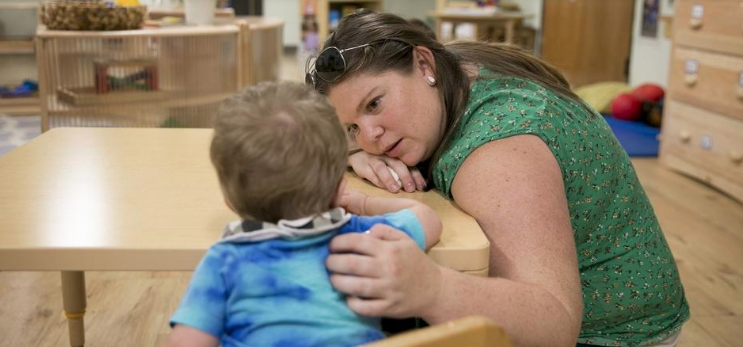In the downtime between giving birth and leaving the hospital, new moms get a crash course in life with a newborn.
Nurses explain how to feed a baby. How to safely put a baby down for a nap (always on the child’s back). How to make sure the car seat is secure and the house is babyproofed. How a mother can get help for postpartum depression. What precautions she should take if the doctor prescribed an opioid medication after a Caesarean section.
“We realize it is so much information, we can’t just give them a list and say goodbye,” Laura Evans, the director of women’s services at St. David’s South Austin Medical Center, told me. Rather, the nurses provide the information in installments throughout a new mother’s hospital stay.
It’s impossible to cover everything. Among the things, new parents don’t learn before leaving the hospital: How to find a good daycare.
I’ve been thinking about that a lot since reading the Unwatched series produced by the American-Statesman’s investigative team. The series pointed to alarming holes in the state’s oversight of day care facilities, and our editorial board has rightly called on Texas lawmakers to step up enforcement efforts and provide better information to the public.
But state agencies aren’t the only ones in this ecosystem. And this is an area where new parents could use some help — not only to learn how to navigate the database of daycare facilities’ violations but to understand the distinctions between licensed, registered and listed child care facilities. (It matters if you care about the kind of training and inspections a facility receives.)
Hospitals can’t explain everything during a mom’s stay. But St. David’s South is working with Austin Public Health and the United Way for Greater Austin to keep the conversation going after young families have gone home.
The three groups are collaborating on the first installation of Texas Family Connects, a program that provides a home visit with a nurse between three and 12 weeks after a mother and her baby have left the hospital.
The home visit is free and completely voluntary. The program began with a soft launch in September, finding moms through doctors’ referrals. Last week it ramped up to reach every mom, regardless of income level, who gives birth at St. David’s South.
Cathy McHorse, vice president of the Success by 6 initiative at the United Way, told me the home visit takes several hours as a nurse from Austin Public Health runs through a 12-point checklist on the well-being of mother and child, answering questions and recommending programs that can help. Moms can get one or two follow-up visits at no cost, thanks to the grants funding this effort.
Importantly, the nurse’s checklist includes a discussion about child care options: What does your family need? Do you know where to find information? Do you need financial support?
McHorse hopes the Texas Family Connects program can eventually be expanded to reach all moms in Travis County. In the meantime, she pointed to another helpful resource from Early Matters Greater Austin, a coalition of business leaders supporting early childhood education.
The coalition recently produced the Family-Friendly Workplace Toolkit to help businesses better meet their employees’ family needs. Among other things, the toolkit provides information on how companies can help staffers apply for childcare subsidies, a scarce pot of grants that can make the difference in a family’s ability to afford quality daycare.
Many parents are also getting help by calling 211, the social services hotline operated by the United Way. Staffers provide information on how to search the state’s database of daycares, though McHorse noted more than half of the 2,500 calls the hotline received last year on childcare involved people needing financial assistance.
That’s one area where the state needs to do more: As our editorial board has noted, Texas is one of two states that does the bare minimum to pull down federal grants helping lower-income families afford better daycare.
Legislators have work to do, but it’s worth applauding the efforts of health care providers, nonprofits and employers who are helping young families find quality care for their kids. The stakes are too high: Parents shouldn’t have to find their way alone.
